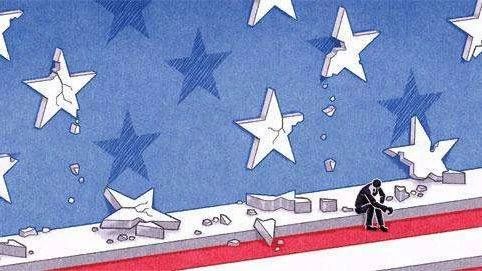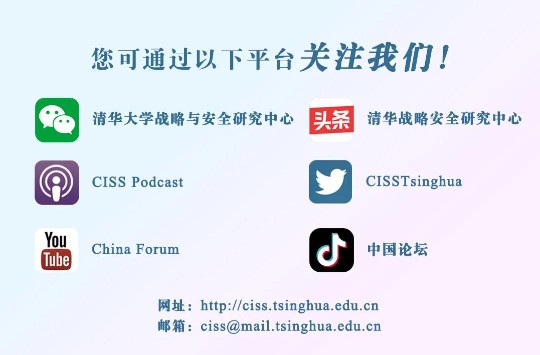周波:中国论坛特约专家、清华大学战略与安全研究中心研究员
中国“韬光养晦”外交政策彻底结束了吗?
这是美国前助理国务卿坎贝尔(Kurt M. Campbell)与外交关系委员会高级研究员胡佩尔(Mira Rapp-Hooper)在《外交事务》联合撰文《北京不再韬光养晦》(China Is Done Biding Its Time)中提到的问题,他们认为自从新冠疫情席卷全球以来,中国利用疫情造成的混乱局面和无所作为的美国政府留下的全球权力真空,展开了前所未有的外交攻势。
同样,美国前国防部副部长米歇尔•弗卢努瓦(Michèle Flournoy)近期在《金融时报》文章中断言中国与印度的边界冲突是中国“越来越咄咄逼人”的又一征兆。
这类观点在西方媒体中甚嚣尘上,需要我们认真审视。所谓的“咄咄逼人”,无论是在南海还是加勒万河谷,都不过是中国对其主权所面临挑战的回应。中国不需要利用新冠疫情带来的“机会”,因为中国在军事上比这些国家强大。
中央在香港实行“一国两制”的政策,“一国”是实行“两制”的前提,“两制”并不意味着中央政府应该容忍近年来困扰香港的骚乱。香港国安法是中央政府在“是可忍、孰不可忍”情况下做出的回应。
尽管美国的实力是否下降还有待商榷,但大多数人至少对美国相对于新兴经济体等国家已经衰落这个观点表示赞同。而唐纳德•特朗普才是“美国衰落”论的最大拥趸。2016年,他靠先渲染一番“美国浩劫”,然后再抛出“美国优先”赢得了美国总统大选。
民主党总统候选人拜登(Joe Biden)和前国家安全顾问约翰•博尔顿(John Bolton)称特朗普为“例外”,但如果特朗普在11月再次当选美国总统,他肯定不是“例外”。这位每天都行为怪诞的总统看起来更像是集中体现了一个政治分裂、对未来悲观的国家的长期趋势。

△美国衰落,已难阻挡(资料图)
即使美国实力下降,北京还有比与华盛顿对抗更重要的事情要做,其中最重要的是到2049年实现中华民族的伟大复兴。因此,即使受疫情影响,中国取消了2020年国内生产总值(GDP)增长的明确目标,却没有放弃在今年年底前消除极端贫困的承诺。
华盛顿将北京描述为“咄咄逼人”或“胁迫他国”尤其可笑。美国前总统卡特2019年在与特朗普的电话交谈中,将美国称为“世界史上最好战的国家”,并表示在美国242年历史过程中,美国作为一个国家只有16年处于和平状态。迈克尔•林德(Michael Lind)教授在2019年美国《国家利益》杂志中也指出,“现在美国同时进行的小型战争之多超过历史上任何时候”。
相比之下,中国自1979年以来没有卷入过战争。在加勒万河谷发生的致命斗殴非常不幸。尽管如此,双方士兵还是都保持了一份默契,即不要向对方开枪。
美国对华政策的基础是自恋(美国副总统彭斯说“我们在过去25年重建了中国”)和幻觉(美国对华战略方针声称,中国“快速的经济发展和与世界的联系并没有如美国所希望那样,使中国与以公民为中心的、自由的和开放的国际秩序趋同”)。
北京绝不可能在这方面误导华盛顿——中国的政治体系和社会稳定一直是中国的核心利益。
事实证明,冷战后过度自信的美国是危险的。仅美国在阿富汗的战争就造成数十万人死亡,其中包括2300多名美军士兵。但缺乏自信的美国可能更危险。华盛顿已经卸下面具,动用一切资源来维护其主导地位,打压中国。
美国一再通过法案插手台湾问题、改变其在南中国海问题上不选边站队的政策,以及呼吁盟国和伙伴与华盛顿联合起来反对北京等都很清楚说明这一点。美国在世界各地打压中国电信公司华为,并不是因为华为的5G网络如美国国务卿蓬佩奥(Mike Pompeo)所声称的那样是中国情报部门的“木马”,而是因为如果华为的5G系统被广泛采用,美国可能会失去其在通信技术领域的霸主地位。
中国如何逆风而行,继续和平发展?中国政府相信世界正在经历“百年未有之大变局”,但是当前中国也处于“近代以来最好的发展时期”。当今世界最大的变局就是中国的日益强大。
在亚太地区,中国的邻国担心被迫在中国或美国之间选边。美国国防部长埃斯珀(Mark T. Esper)在去年8月份的亚洲之行中表示,五角大楼希望于数月内在亚洲部署美国中程导弹。东盟一些国家可能希望美国能够制衡中国,但绝不希望以把南中国海变成自家门口的战场为代价。
北京和华盛顿都不希望发生冲突。但是,如果他们之间发生冲突,冲突将发生在西太平洋,而不是发生在夏威夷或美国本土附近海域。在西太平洋,中国人民解放军至少享有地理之便。美军不一定能够获胜。兰德公司进行的多次计算机模拟显示,战争一旦爆发,美国可能输给中国。
在去年联合国大会第74届会议上,联合国秘书长安东尼奥•古特雷斯(Antonio Guterres)警告世界将一分为二出现“大裂痕”——两个最大的经济体制造了彼此分离、相互竞争的社会。令人遗憾的是,目前看起来这预言比任何时候都更加真切。
Why China must beware a less confident US, politically divided and pessimistic about its future
Has China’s foreign policy restraint ended? This is the question raised by Kurt M. Campbell and Mira Rapp-Hooper in their essay “China is done biding its time” in Foreign Affairs. They argue that since the pandemic first engulfed the world, China’s government has engaged in an unprecedented diplomatic offensive, taking advantage of the ensuing chaos and the global power vacuum left by a no-show US administration.
Likewise, in a recent opinion piece in the Financial Times, Michele Flournoy, a former US undersecretary of defence for policy, concludes that China’s border clash with India is another sign of the county’s growing assertiveness.
Such views, preponderant in Western media, need serious examination. China’s “assertiveness”, be it in the South China Sea or the Galwan Valley, is a response to the challenges it perceives to its sovereignty. And China doesn’t need to make use of the “chance” provided by the pandemic since China is stronger than these countries militarily.
In Hong Kong, where the “one country, two system” framework applies, “one country” comes first, and “two systems” doesn’t mean the central government should tolerate the unrest that has plagued the city in recent years. The national security law is an “enough is enough” response.
While it is debatable whether the US has declined in power, most people agree at least that the US has declined relative to other nations, such as the new emerging economies. But Donald Trump is the biggest proponent of the “decline” narrative. His sketch of “American carnage” and then championing of “America first” helped him win the presidential election in 2016.
Democrat presidential hopeful Joe Biden and former national security adviser John Bolton called Trump “an aberration”, but he surely isn’t one if he is re-elected in November. This president, who engaged in aberrant behaviour on a daily basis, would then look more like the culmination of long-standing trends in a country that is politically divided and broadly pessimistic about its future.
Even if the US is in retreat, Beijing has more serious business to attend to than confront Washington, most importantly the “great rejuvenation of the Chinese nation” by 2049. Thus, even if the Chinese government decided against setting a gross domestic product target for 2020 due to the pandemic, it hasn’t relented on its commitment to eliminate extreme poverty by the end of this year.
It is particularly ludicrous to hear Washington describe Beijing as “assertive” or “coercive”. In a telephone conversation with Trump in 2019, former US president Jimmy Carter referred to the US as “the most warlike nation in the history of the world” and said the US has been at peace for only 16 of its 242 years as a nation. Professor Michael Lind pointed out in The National Interest in 2019 that “the US is now engaged in more simultaneous small wars on more fronts than at any point in its history”.
In comparison, China has had no wars since 1979. The deadly brawl in the Galwan Valley is most unfortunate; still, soldiers from both sides had a tacit understanding of not shooting at each other.
American policies towards China have been based on narcissism (“We rebuilt China over the last 25 years”, remarked US Vice-President Michael Pence) and hallucination (the US Strategic Approach to China noted that China’s “rapid economic development and engagement with the world did not lead to convergence with the citizen-centric, free and open order as the United States had hoped”).
Beijing should never have misled Washington in this regard – stability in its political system and society has always been China’s core interest.
An overconfident US after the Cold War has proved dangerous. The US’ war in Afghanistan alone killed tens of thousands of people, including more than 2,300 American troops. But a less confident US is probably more dangerous. Washington has finally dropped its mask and is making all its resources available to maintain its primacy and suppress China.
This is clear in the US’ bills on Taiwan, its change of policy of not taking sides on the South China Sea issue and calls to allies and partners to band together with Washington against Beijing. The US’ efforts around the world against Chinese telecom company Huawei are not really because Huawei’s 5G network is a “Trojan horse” of Chinese intelligence services, as US Secretary of State Mike Pompeo asserted, but that if Huawei’s 5G system is widely adopted, the US might lose its supremacy in communication technology to China.
How could China continue to develop peacefully amid these headwinds? The Chinese government believes that while the world is experiencing profound changes “unprecedented in a century”, this is also the “best time for China’s development since modern times”. The most profound change the world is experiencing is China growing ever stronger.
In the Asia-Pacific, China’s neighbours fear being pushed to take sides by either China or the US. During an Asian tour in August last year, US Defence Secretary Mark T. Esper said the Pentagon would like to deploy intermediate-range American missiles in Asia within months. Some Association of South Asian Nations members might wish the US could balance China, but never at a cost of turning the South China Sea into a battlefield on their doorsteps.
Neither Beijing nor Washington wants a conflict. But should a conflict occur between them, it will occur in the Western Pacific, not in the waters off Hawaii or continental USA. The People’s Liberation Army thus at least enjoys the convenience of geography. There is no guarantee that the US military will prevail. War games conducted by Rand showed that the US could very well lose a war to China.
At the 74th session of the UN General Assembly last year, UN Secretary General Antonio Guterres warned against a “great fracture” – the world splitting in two with the two largest economies creating separate and competing worlds. Sadly, this looks more real than ever.
中国论坛国佳译自《南华早报》
本文7月29日首发于观察者网

